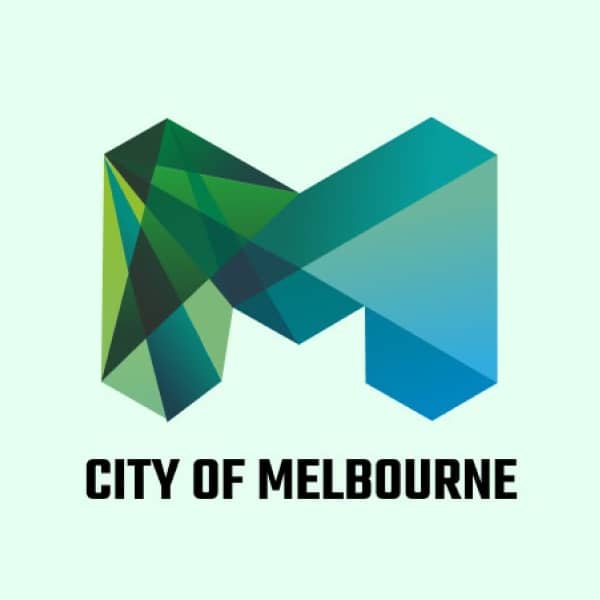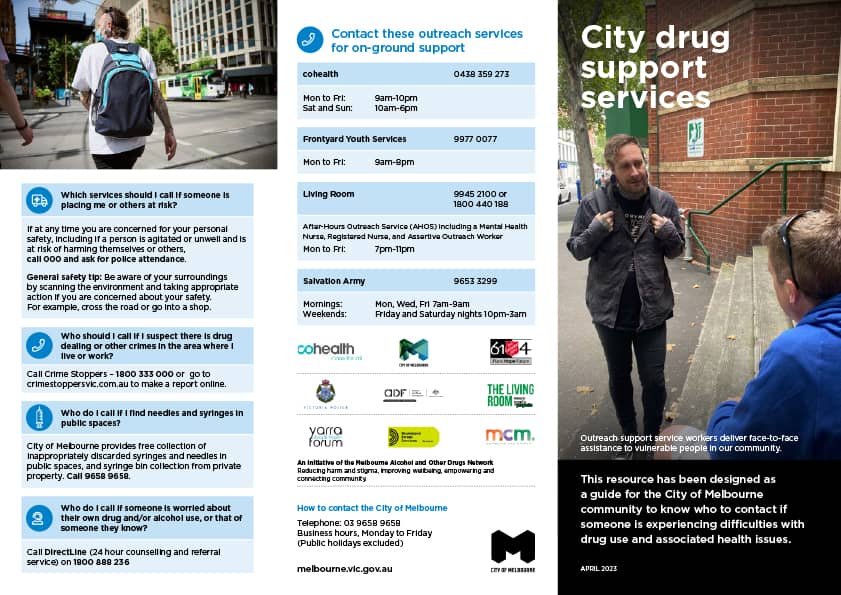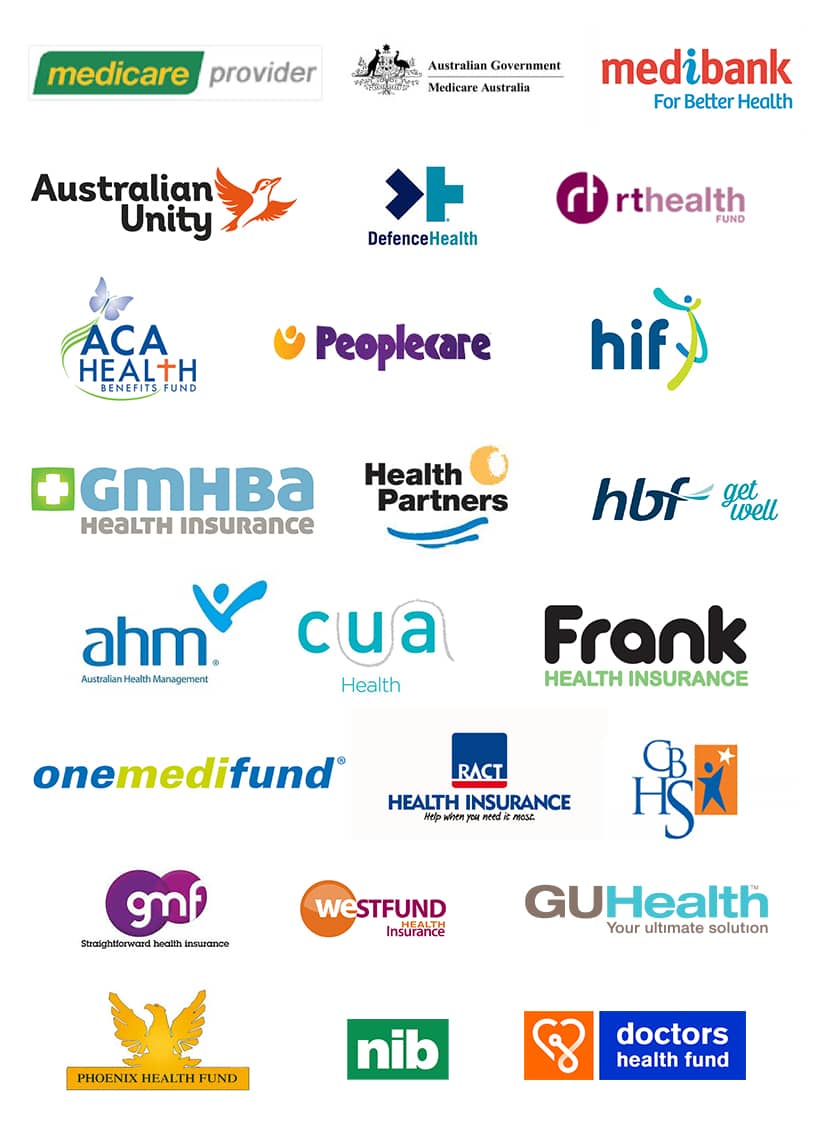
Melbourne City Council
Melbourne CBD, Victoria
Specialities
Family Counselling, Drug Addiction, Overcoming Homelessness, Family Violence Support, Gender Equality Support, Elder Abuse, Youth Support, Sexual Assault Support.
Patient Focus
Our patient focus is all-encompassing, extending to anyone and everyone who requires mental health support. We are committed to providing compassionate care and assistance to individuals from all walks of life, regardless of age, gender, background, or any other factors that may affect their mental well-being.
Service Types
We are dedicated to providing holistic care through our robust support networks, acknowledging that mental health is influenced by various factors. Our commitment is to offer comprehensive assistance that considers all aspects of an individual’s mental well-being. Through our strong support networks, we aim to ensure that everyone in need of mental health support receives the care and resources they require.
About Melbourne City Council Mental Health Support
Booking / Contact Enquiry
Need assistance with booking? Contact us at 1300 182 192
or email support@mindhubdirectory.com
Like? Share with your friends
The City of Melbourne is committed to providing essential support for mental health within its community. They have shown a strong dedication to promoting mental well-being and ensuring that individuals have access to the resources and services they need. As a testament to their commitment, a list of valuable mental health support contacts can be found on Mind Hub Directory, which serves as a valuable resource for those seeking assistance and guidance in Melbourne. The City of Melbourne’s proactive approach to mental health support demonstrates their ongoing efforts to create a more caring and inclusive community.
Family support and counselling services are available to families with children up to the age of 18 who live, work or study in the City of Melbourne.
We provide social work and family support services to families with complex issues and help families to overcome practical and emotional challenges. We advocate for and can provide referrals for counselling where required as well as linking families to social support and community activities.
Family Support and Counselling Intake
Telephone- 03 9340 1422. supportandcounselling@melbourne.vic.gov.au
Ending homelessness is a priority for the City of Melbourne.
Through our special entity, Homes Melbourne, we are working with partners to deliver 6000 affordable homes and help end homelessness in our city.
We work across the entire housing spectrum to help people who are rough sleeping to move into short-term, supported housing while increasing long-term affordable rental housing and affordable housing.
Our work to prevent and help end homelessness
- Our daily support team links people sleeping rough to support services, health and housing to find permanent pathways out of homelessness.
- We convene the Melbourne Service Coordination Project, which brings together Homes Victoria and 14 agencies working with people sleeping rough.
- We lead the ‘By Name List’, which gathers data about homelessness and links people to the support they need and ultimately into permanent housing.
- We have Australia’s first dedicated Library Social Worker to provide support and referrals to people experiencing homelessness.
- We partner with and fund organisations to prevent homelessness and support people at risk of homelessness:
- Salvation Army Melbourne Project 614 – provides support by supplying meals, clothing and counselling and working with clients to help create pathways out of their current state of marginalisation.
- Melbourne City Mission Frontyard Youth Services – a specialist youth service located in Melbourne’s CBD. Young people can find emergency accommodation, get quality case management from staff and access a range of co-located and visiting services. The team supports young people to meet their physical, emotional and social needs and develop pathways out of homelessness.
- cohealth Central City Community Health Service – a holistic health service for people experiencing homelessness in the CBD. cohealth provides dietitian services, drug and alcohol counselling, homelessness allied health, homelessness mental health service and homelessness support services. It is underpinned by a human rights framework and trauma-informed practice.
- Salvation Army Youth Street Teams – volunteers who connect with intoxicated young people who have become separated from their friends and vulnerable to potential assault, abuse. The team operates on Friday and Saturday nights between 10pm and 5am.
Melbourne – A place for everyone
Melbourne is visited by many different people, including those at risk of, or experiencing, challenges with their drug use. They may also be dealing with homelessness and in some cases have complex mental health issues. Some have multiple and complex needs.
Most people impacted by drugs and other issues, such as mental health, consider the city to be a place where they feel safe and socially connected, and where they can receive support through the available health services.
What should I do if someone appears to be experiencing difficulties?
1. Firstly, be mindful of your personal safety. Ask the person if they need help and, if you can assist, do so. If appropriate you could offer water, shade, a seat or ask if you can call their support person or worker on their behalf.
If you need further assistance or are unsure of what to do and need guidance, contact the services listed.
2. If the person appears to be seriously unwell, such as at risk of a drug overdose, or experiencing a severe mental health episode or other serious medical condition, call an ambulance on 000 immediately.
Don’t delay calling an ambulance because you think the person might get into trouble – it’s critical they receive immediate medical assistance. Ambulance officers are not obliged to involve the police. Stay with the person until the ambulance arrives. This small gesture of kindness could save a life.
Signs of overdose from opioids (such as heroin) may include shallow or no breathing, pale complexion, purple lips and the person may be unresponsive. It might be difficult to determine what drug a person has taken, so simply deal with what you see, not what you think might have happened.
3. If you are unsure of what substance someone may have taken, or not sure of what to do, please call one of the services listed.
Which services should I call if someone is placing me or others at risk?
If at any time you are concerned for your personal safety, including if a person is agitated or unwell and is at risk of harming themselves or others, call 000 and ask for police attendance.
General safety tip: Be aware of your surroundings by scanning the environment and taking appropriate action if you are concerned about your safety. For example, cross the road or go into a shop.
Who should I call if I suspect there is drug dealing or other crimes in the area where I live or work?
Call Crime Stoppers – 1800 333 000 or go to crimestoppersvic.com.au to make a report online.
Who do I call if I find needles and syringes in public spaces?
City of Melbourne provides free collection of inappropriately discarded syringes and needles in public spaces, and syringe bin collection from private property. Call 9658 9658.
Who do I call if someone is worried about their own drug and/or alcohol use, or that of someone they know?
Call DirectLine (24 hour counselling and referral service) on 1800 888 236.
Who can I contact if I believe someone needs help with their drug use or related health issues?
If you are concerned about the welfare of a person who may be at serious risk of harm due to their drug use or other factors, call one of the following services (you may wish to add these numbers to your contacts in your mobile phone).
Cohealth
Located at 53 Victoria Street Melbourne, cohealth’s City Street Health program is a comprehensive street based outreach service staffed by health workers such as a GP and nurses. They cover most of the city.
Services include Drug and Alcohol Outreach Support, Homeless Allied Health, Drug and Alcohol Counselling, Homeless Mental Health, Homeless Support Services.
Telephone 0438 359 273 Monday to Friday: 9am-10pm and Sat and Sun: 10am-6pm
The Living Room
Located at 7-9 Hosier Street Melbourne, The Living Room is a primary health service that provides free healthcare and support to improve the physical, mental and social wellbeing of people who are, or are at risk of, experiencing homelessness. They have GPs, nurses and alcohol and other drug counsellors onsite.
Telephone 9945 2100 or 1800 440 188 After-Hours Outreach Service (AHOS) including a Mental Health Nurse, Registered Nurse, and Assertive Outreach Worker Monday to Friday: 7pm-11pm
Salvation Army Project 614
Located at 69 Bourke Street Melbourne, Salvation Army Project 614 supports and works with people who are experiencing homelessness, are at risk of becoming homeless, or may be experiencing mental health issues, alcohol and other drug addictions, and social poverty. Project 614 provides services and programs to help people create pathways out of their current circumstances.
Telephone 9653 3299
Mornings: Monday, Wednesday and Friday 7am-9am
Weekends: Friday and Saturday nights 10pm-3am
Services for young people
Drum Youth Services
Located at 100 Drummond Street Melbourne, The Drum delivers youth services in Carlton, Kensington, North Melbourne, the CBD, Richmond and Collingwood. Funded by the City of Melbourne, The Drum provides education, employment pathways, and helps young people strengthen their social connections and functional skills. People aged 12–25 years can access services, support and programs for social connection, family life and employment pathways. Telephone 9663 6733.
Frontyard Youth Services
Located at 19 King Street Melbourne, Frontyard Youth Services is a specialist youth service that aims to support young people to meet their physical, emotional and social needs and to develop pathways out of homelessness. Telephone 9977 0077 (Monday to Friday: 9am-8pm)
Youth Support and Advocacy Service, Youth Drug and Alcohol Advice Telephone
This telephone service provides expertise in substance misuse and treatment for Victorians aged 10-25 years.
Call 1800 458 685 for free, confidential support.
Child Protection Services
- If you are concerned about the welfare of a young person under the age of 18 years, you can contact any of the services listed.
- However, if the young person is at serious risk of harm due to their drug use or other factors, contact Victoria Police by calling 000 or Child Protection Services on 1300 664 977.
The Zone phone
A partnership between Youth Support and Advocacy Service, Drummond Street and Odyssey House Victoria, the Zone offers intersectional and whole-of-family alcohol and other drugs support to young people aged 12-25 years and their families across the North and West of Melbourne. Telephone 1800 161 327 or Email thezone@ysas.org.au
If you’re experiencing family violence or you’re concerned for another person’s safety during COVID-19, there is help available.
If you’re in immediate danger, call 000.
If you or a family member need family violence information and support the following organisations are able to assist:
- 1800 RESPECT – National sexual assault, domestic family violence counselling service (24/7 support)
Call: 1800 737 732 / NRS: 1800 555 677 / Interpreter: 13 14 50 - Family violence crisis response and support during coronavirus – from Victoria’s Department of Health and Human Services
For support for women and children contact
- safeSteps: Family Violence Response Centre
Call: 1800 015 188, 24/7 family violence response line - GenWest (formerly Women’s Health West)
Call: 1800 436 937 - InTouch Multicultural Centre Against Family Violence
Call: 1800 755 988 toll free (Monday to Friday, 9am to 5pm)
For support for men contact
- Men’s Referral Service / No To Violence
Call: 1300 766 491 - MensLine Australia
Call: 1300 789 978
For a specialist Aboriginal family violence service contact
- Djirra – Aboriginal Family Violence Prevention and Legal Service Victoria
Call: 1800 105 303 toll free (Monday to Friday, 9am to 5pm)
For a specialist LGBTIQ family violence service contact
- WithRespect
Call: 1800 LGBTIQ (1800 542 847)
For support for older people contact
- Seniors Right Victoria (Elder abuse)
Call: 1300 368 821
For information on keeping safe from family violence during COVID-19 visit:
Drug Support Services Flyer
Check out our Drug Support Services Flyer below.
Additional details
Languages Spoken
English
In the City of Melbourne, 46 per cent of residents speak a language other than English at home. We understand you may want to communicate with us in the language you are most comfortable with.
Our Multilingual Information phone service provides access to interpreters who speak different languages.
Location
90-120 Swanston Street, Melbourne VIC 3000.
Telephone: 03 9658 9658
Website: melbourne.vic.gov.au




